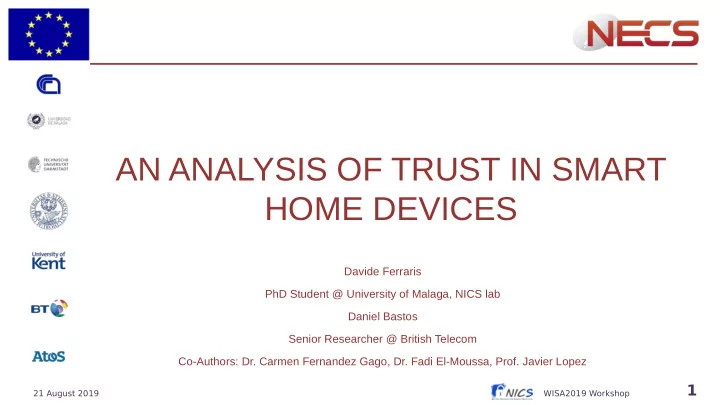

AN ANALYSIS OF TRUST IN SMART HOME DEVICES Davide Ferraris PhD Student @ University of Malaga, NICS lab Daniel Bastos Senior Researcher @ British Telecom Co-Authors: Dr. Carmen Fernandez Gago, Dr. Fadi El-Moussa, Prof. Javier Lopez 1 21 August 2019 WISA2019 Workshop
Outline Introduction Motivation Use Case Findings Trust Model Conclusion 2 21 August 2019 WISA2019 Workshop
Introduction (Trust) Trust is difficult to define because: “Trust is a multidimensional, multidisciplinary and multifaceted concept” (Yan et al., 2008) “The personal, unique and temporal expectation that a trustor places on a trustee regarding the outcome of an interaction between them” (Moyano et al., 2012) 3 21 August 2019 WISA2019 Workshop
Introduction (IoT) IoT o Connection “everywhere” o Remote Control o Protocols (Many) o Low protection o Low computation power Smart Home security enhanced by Trust 4 21 August 2019 WISA2019 Workshop
Motivation 5 21 August 2019 WISA2019 Workshop
Use Case Smart Home Scenario Users IoT Devices 6 21 August 2019 WISA2019 Workshop
Findings Alexa (Only the owner can see what is going on through the smartphone app) Google (Too much trust for the connected users, every connected user can see what is going on and can cast commands) Google (Wi-Fi steal) Anytime the Wi-Fi is not available the device creates a WAP that allow any user to configure it. (Not ownership) Hue (Some details are revealed in clear: Bridge ID, IP, commands) 7 21 August 2019 WISA2019 Workshop
Findings Google 8 21 August 2019 WISA2019 Workshop
Findings Alexa & Hue 9 21 August 2019 WISA2019 Workshop
Findings Google & Hue 10 21 August 2019 WISA2019 Workshop
Trust model How the system is? Improvements? Google: Trust in the users, (set-up) security must be improved Alexa: Less trust in the other users, (set-up) security can be improved Hue: “Physical” trust, (set-up) good security measure 11 21 August 2019 WISA2019 Workshop
Trust Model Role: HO, HM, HG, MU Context: {1,2,3,4} Score: {0,1,2,3,4,5} Trust Metric : TM(Role, Context, Score) How it works? Subtraction of Score and Context to decide if a user is allowed to do something. 12 21 August 2019 WISA2019 Workshop
Trust Model Trust Metric : TM(Role, Context, Score) Possible values (Negative, Zero, Positive) Negative (No actions are allowed for the particular context) Zero (You can only check what is going on) Positive (You are trusted enough to cast commands) 13 21 August 2019 WISA2019 Workshop
Conclusion Different trust models related to Alexa, Google and Hue Improvement is needed Improvement proposed Contact: ferraris@uma.es 14 21 August 2019 WISA2019 Workshop
Questions? Thanks to the European Commission, NeCS Project and to the university of Malaga for the opportunity given to me. This project has received funding from the European Union’s Horizon 2020 research and innovation programme under the Marie Sklodowska-Curie grant agreement No. 675320. This work reflects only the author’s view and the Research Executive Agency is not responsible for any use that may be made of the information it contains. 15 21 August 2019 WISA2019 Workshop
Recommend
More recommend